
Best Cross-Platform Tools for Academic Citations
Managing academic citations doesn’t have to be hard. Tools like Sourcely, MyBib, Yomu AI, Trinka AI, and SciSpace simplify the process with features like AI-driven formatting, support for thousands of citation styles, and cross-platform syncing. Here’s what they offer:
- Sourcely: Handles bulk citations with metadata extraction and supports 7,000+ styles.
- MyBib: Offers 9,000+ styles and cloud syncing for easy access across devices.
- Yomu AI: Combines citation management with writing tools like plagiarism detection.
- Trinka AI: Focuses on writing assistance and citation accuracy.
- SciSpace: Tailored for researchers with advanced error detection.
Quick Comparison
| Tool | Citation Styles | Bulk Citations | Writing Assistance | Unique Feature |
|---|---|---|---|---|
| Sourcely | 7,000+ | Yes | No | Metadata extraction |
| MyBib | 9,000+ | Yes | No | Extensive style library |
| Yomu AI | Customizable | Limited | Yes | Plagiarism checker |
| Trinka AI | Multiple | Limited | Yes | Writing integration |
| SciSpace | 2,500+ | Yes | No | Error detection |
Choose the right tool based on your needs: Sourcely for bulk management, MyBib for style variety, Yomu AI or Trinka AI for writing help, and SciSpace for research-heavy projects.
Reference Managers: Everything You Need to Know
Must-Have Features for Citation Tools
The best citation tools come with features that make managing references easier and more efficient. Here are the key features to look out for:
Platform Support
A good citation tool should work seamlessly across different platforms like Windows, macOS, Linux, and mobile devices. For instance, Sourcely integrates with writing platforms, while MyBib keeps your citations in sync through cloud storage.
Citation Format Options
Academic work often requires citations in various styles, from APA and MLA to more niche formats. Tools like MyBib stand out by offering support for over 9,000 citation styles.
Managing Multiple Citations
Handling numerous references can be overwhelming, especially for larger projects. Tools like SciSpace use AI to process multiple citations at once, ensuring consistent formatting. Similarly, Trinka AI helps by automatically spotting and fixing errors in your references.
Format Checking
Proper formatting is crucial for maintaining academic standards. Tools like Yomu AI offer custom formatting options and advanced error detection. Meanwhile, SciSpace uses AI to verify sources and catch mistakes, ensuring your citations are both accurate and reliable.
Leading Citation Tools Review
Explore the top cross-platform citation tools and their standout features. These reviews highlight tools that cater to a variety of citation and writing needs.
Sourcely Overview
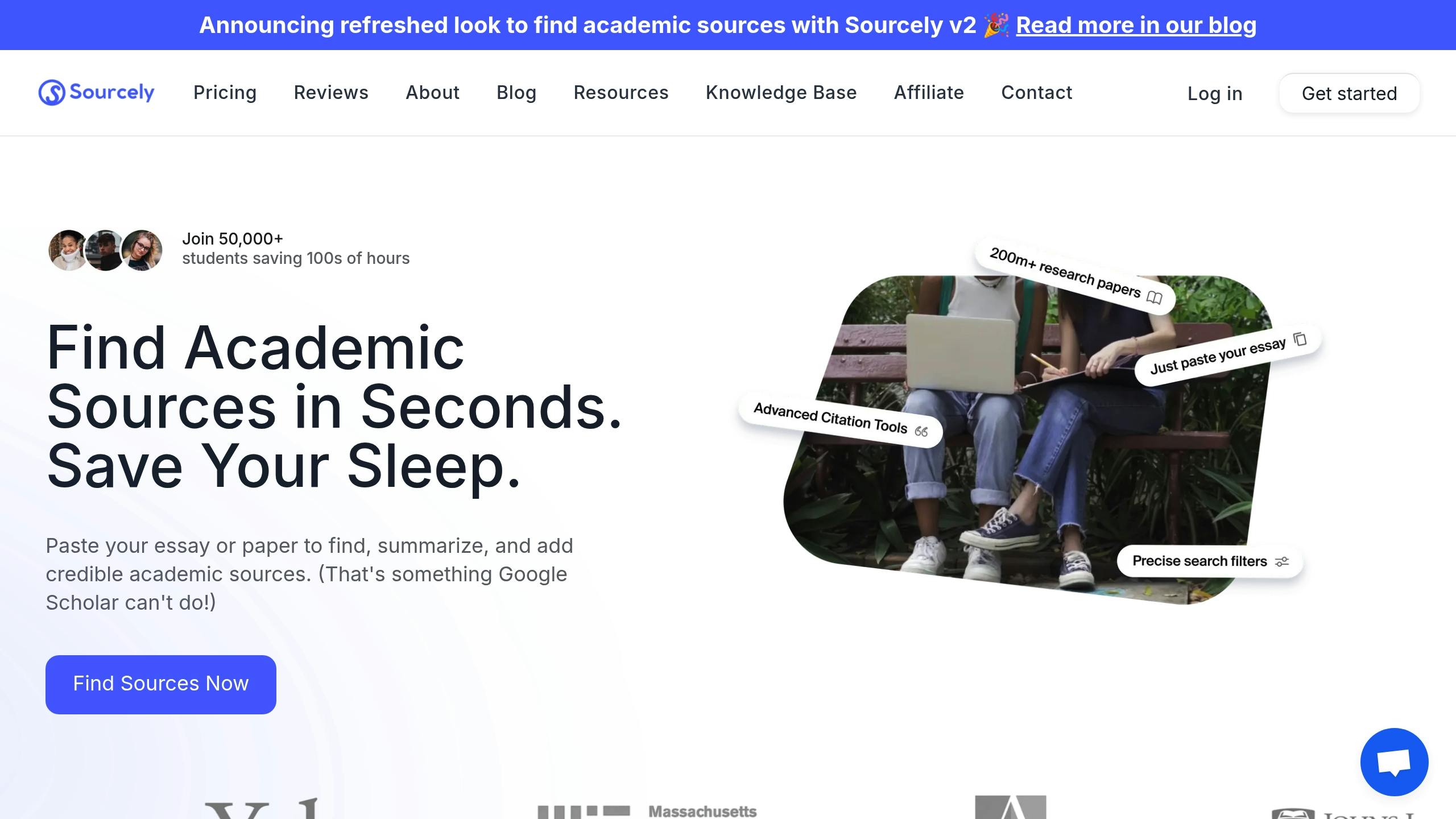
Sourcely stands out for its precision and support for over 7,000 citation styles. Its automated metadata extraction minimizes manual errors, while real-time accuracy checks ensure reliable citations. The bulk citation feature is especially helpful for handling multiple references efficiently.
Key features:
- Automated metadata extraction for quick citation creation
- Real-time accuracy checks for reliable references
- Seamless integration with major writing platforms
- Comprehensive support for 7,000+ citation styles
These features make Sourcely an excellent choice for users managing large citation projects.
MyBib Features
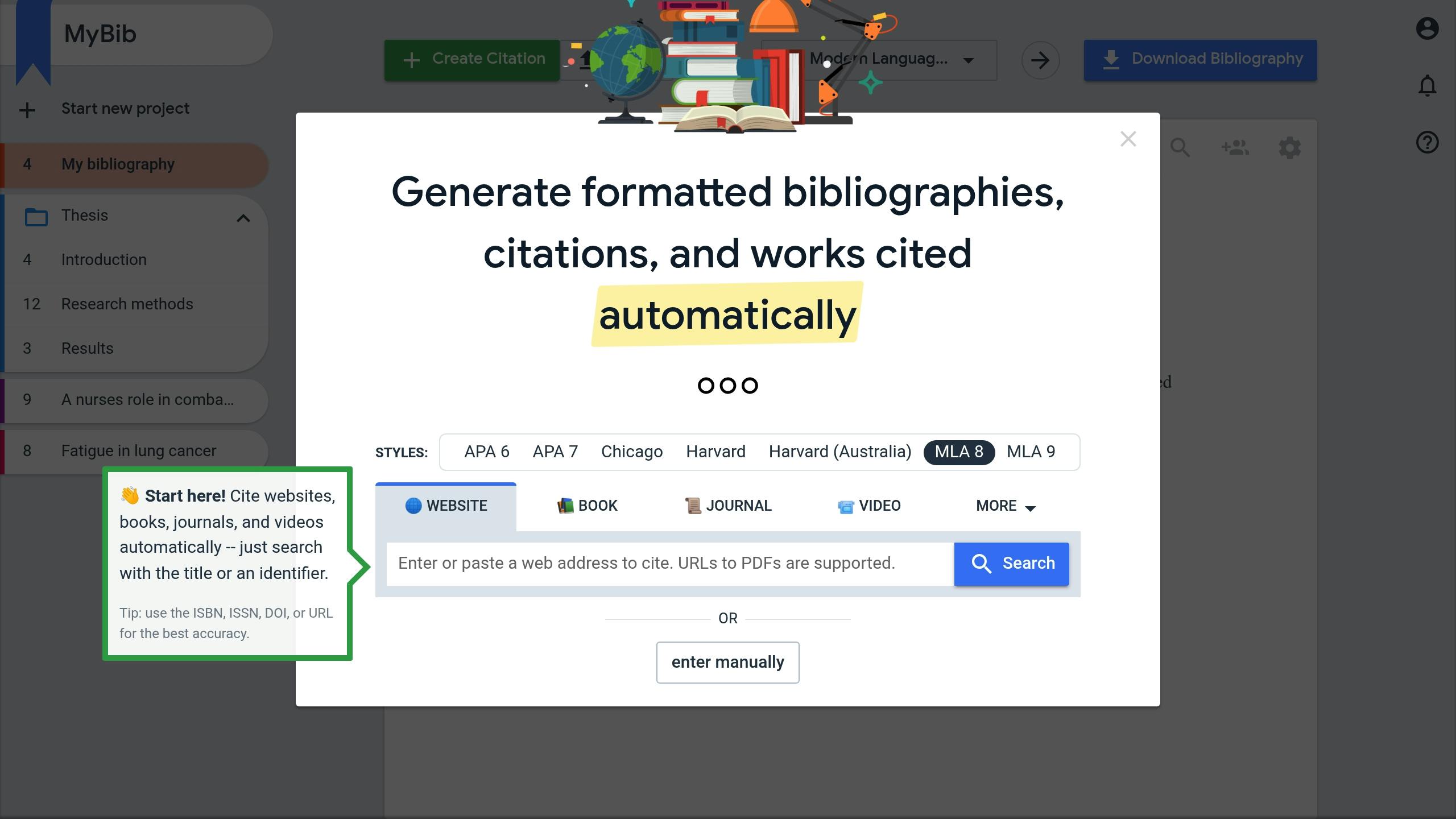
MyBib offers a powerful citation management system enhanced by AI. With support for over 9,000 citation styles, it simplifies the process of creating properly formatted citations.
Highlights:
- AI-driven citation verification for accuracy
- Extensive library with 9,000+ citation formats
- Cloud-based sync for access across devices
- User-friendly interface for organizing bibliographies
MyBib is ideal for those who need a wide range of citation styles and reliable formatting guidance.
Yomu AI Capabilities
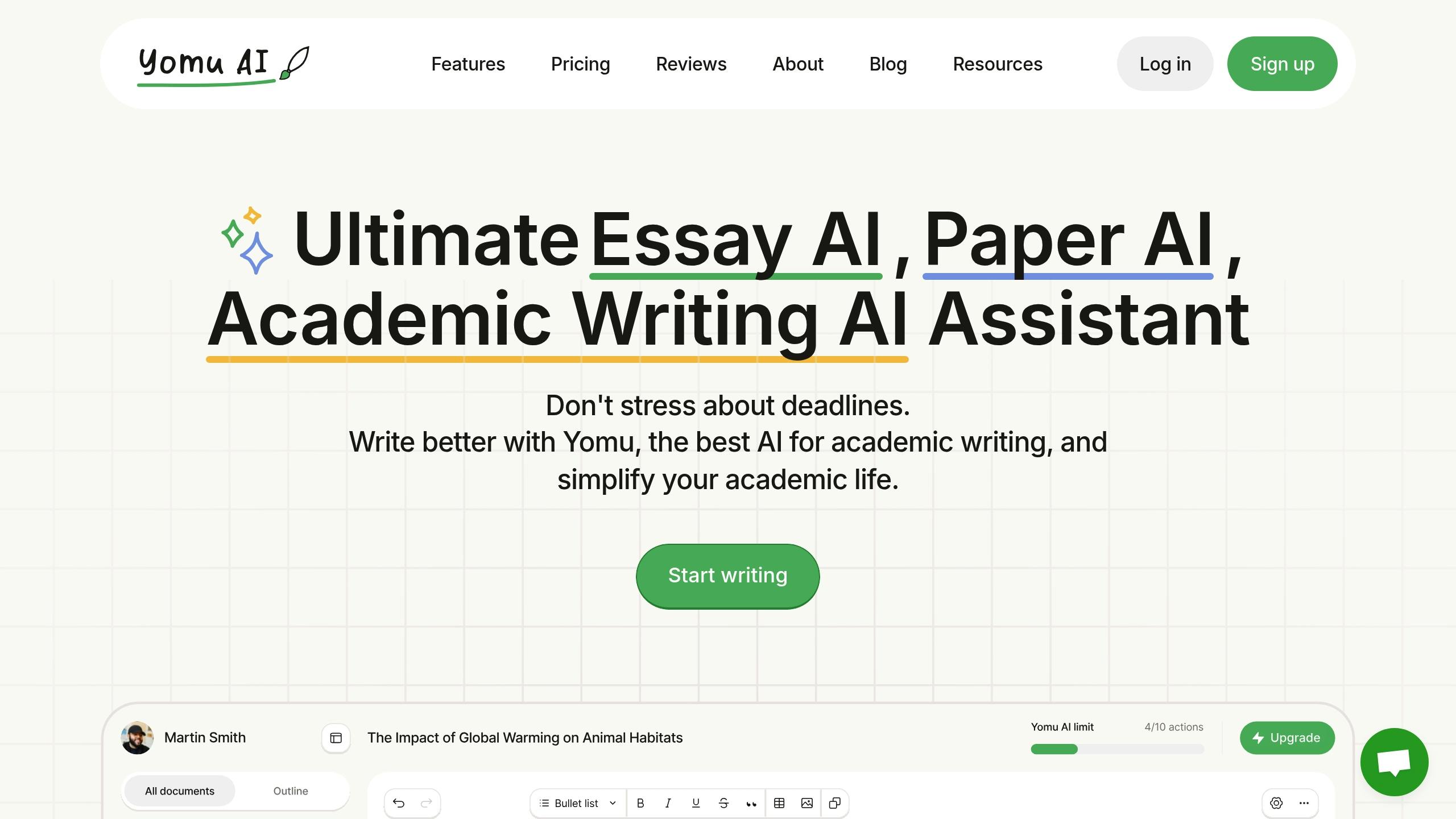
Yomu AI combines writing assistance with citation management, creating a seamless experience for users. Its tools support both citation formatting and text improvement.
Key functionalities:
- AI tools for enhancing sentences and paragraphs
- Built-in citation formatting for streamlined workflows
- Advanced plagiarism detection tools
- Paraphrasing and summarization features
Yomu AI is a solid choice for users who want integrated writing and citation support.
Trinka AI Functions
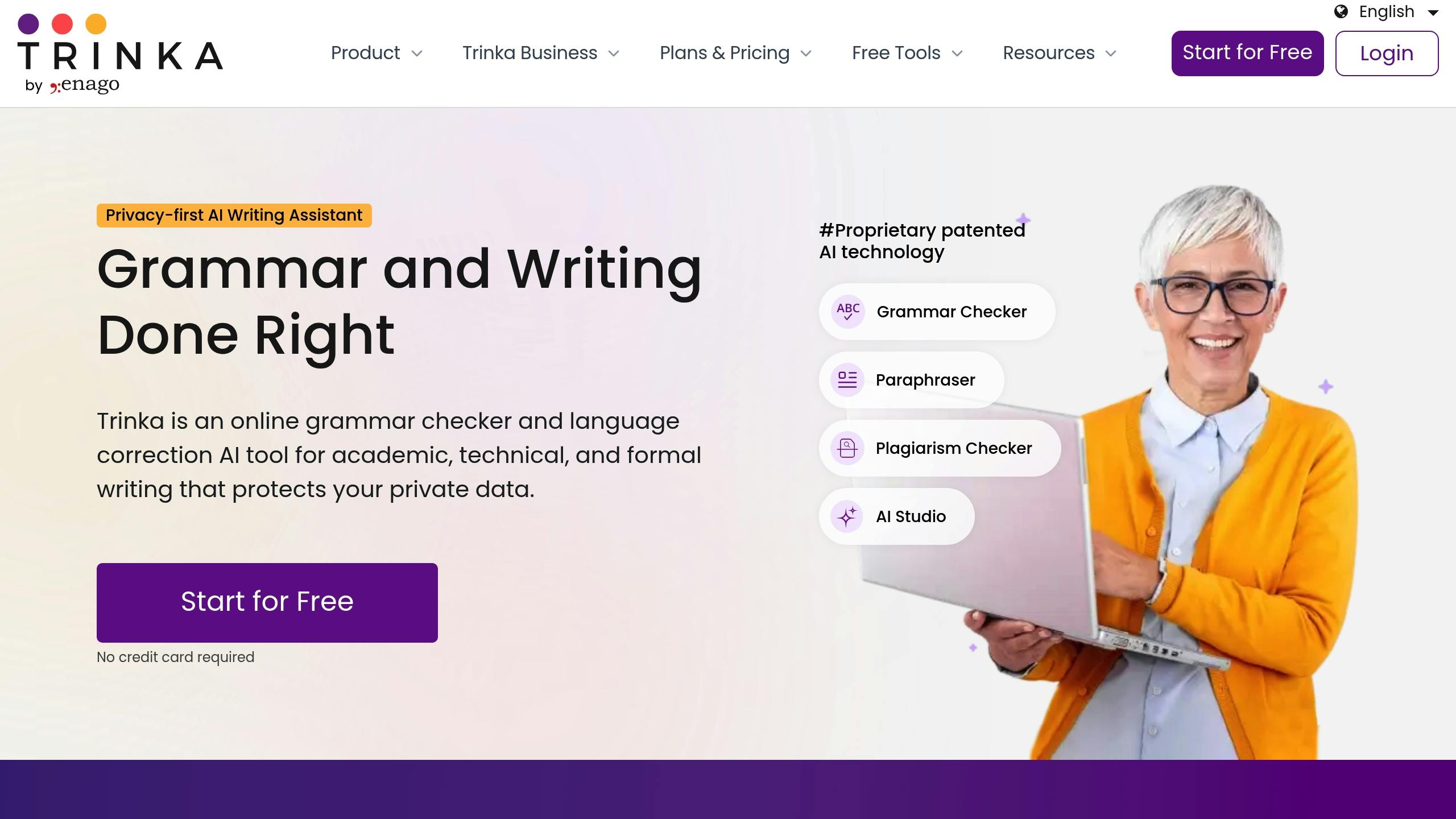
Trinka AI merges citation management with advanced writing assistance, making it a go-to platform for academic authors. It focuses on maintaining citation precision while improving overall writing quality.
| Feature Comparison | Sourcely | MyBib | Yomu AI | Trinka AI |
|---|---|---|---|---|
| Citation Accuracy | High | Good | High | High |
| Style Library | 7,000+ | 9,000+ | Customizable | Multiple |
| Bulk Citations | Yes | Yes | Limited | Limited |
| Writing Assistant | No | No | Yes | Yes |
| Cloud Sync | Yes | Yes | Yes | Yes |
Each tool brings unique strengths to the table, whether it's citation accuracy, style variety, or writing assistance. Your choice will depend on your specific project needs, the volume of citations, and whether you require additional writing tools.
sbb-itb-1831901
Tool Comparison
Choosing the right citation tool depends on how well it fits your workflow. Below, we've outlined key features of popular tools to help you decide.
Sourcely simplifies citation creation by extracting metadata, making it perfect for managing large bibliographies.
MyBib stands out with a library of over 9,000 citation styles. Its AI system helps catch citation errors, making it a solid option for academic work.
Yomu AI combines citation management with writing tools, offering customizable citation formats and a built-in plagiarism checker.
Trinka AI focuses on writing assistance and error detection but supports fewer citation styles.
SciSpace is tailored for research-heavy projects, offering precise error detection.
Here's a quick comparison of their features:
| Tool | Citation Accuracy | Bulk Citation | Styles Supported | Unique Feature |
|---|---|---|---|---|
| Sourcely | High | Yes | 7,000+ | Metadata extraction |
| MyBib | Good | Yes | 9,000+ | Large citation style library |
| Yomu AI | High | Yes | Customizable | Plagiarism checker and custom formats |
| Trinka AI | High | Limited | Multiple | Writing assistant integration |
| SciSpace | Excellent | Yes | 2,500+ | Advanced error detection |
Your choice depends on your needs. If you're managing a lot of citations, Sourcely is a great pick for bulk processing. For extensive style options, MyBib is ideal. Writers looking for integrated tools may prefer Yomu AI or Trinka AI, while researchers might benefit from SciSpace's error detection capabilities.
Choosing the Right Citation Tool
Picking the best cross-platform citation tool can make a huge difference in how efficiently you manage your academic writing. These tools are designed to handle various needs, making it easier to organize and format references.
For example, Sourcely is a standout for managing large volumes of citations, while MyBib offers over 9,000 citation styles, making it a go-to for students and professionals across different academic fields. AI-powered tools like Yomu AI take things further by offering features like formatting, writing assistance, and even plagiarism checks - all in one place. This reduces the need to switch between platforms, saving you time and effort.
Another key factor is how well these tools fit into your workflow. Cross-platform compatibility is a game-changer, allowing you to manage citations from any device. Tools like Trinka AI and SciSpace excel in this area, offering seamless access regardless of where you work.
Here are some factors to consider when selecting a citation tool:
- Citation volume: Look for tools designed to handle the number of references you typically work with.
- Style library: Ensure the tool supports the citation styles required in your field.
- Workflow integration: Check if the tool works smoothly with your writing process.
- Device compatibility: Make sure it supports all the devices you use.
Modern citation tools are redefining academic writing by focusing on precision and ease of use. With AI-driven features that minimize errors and increase productivity, these tools are indispensable for both students and researchers.
FAQs
Which is better, Zotero, Mendeley, or EndNote?
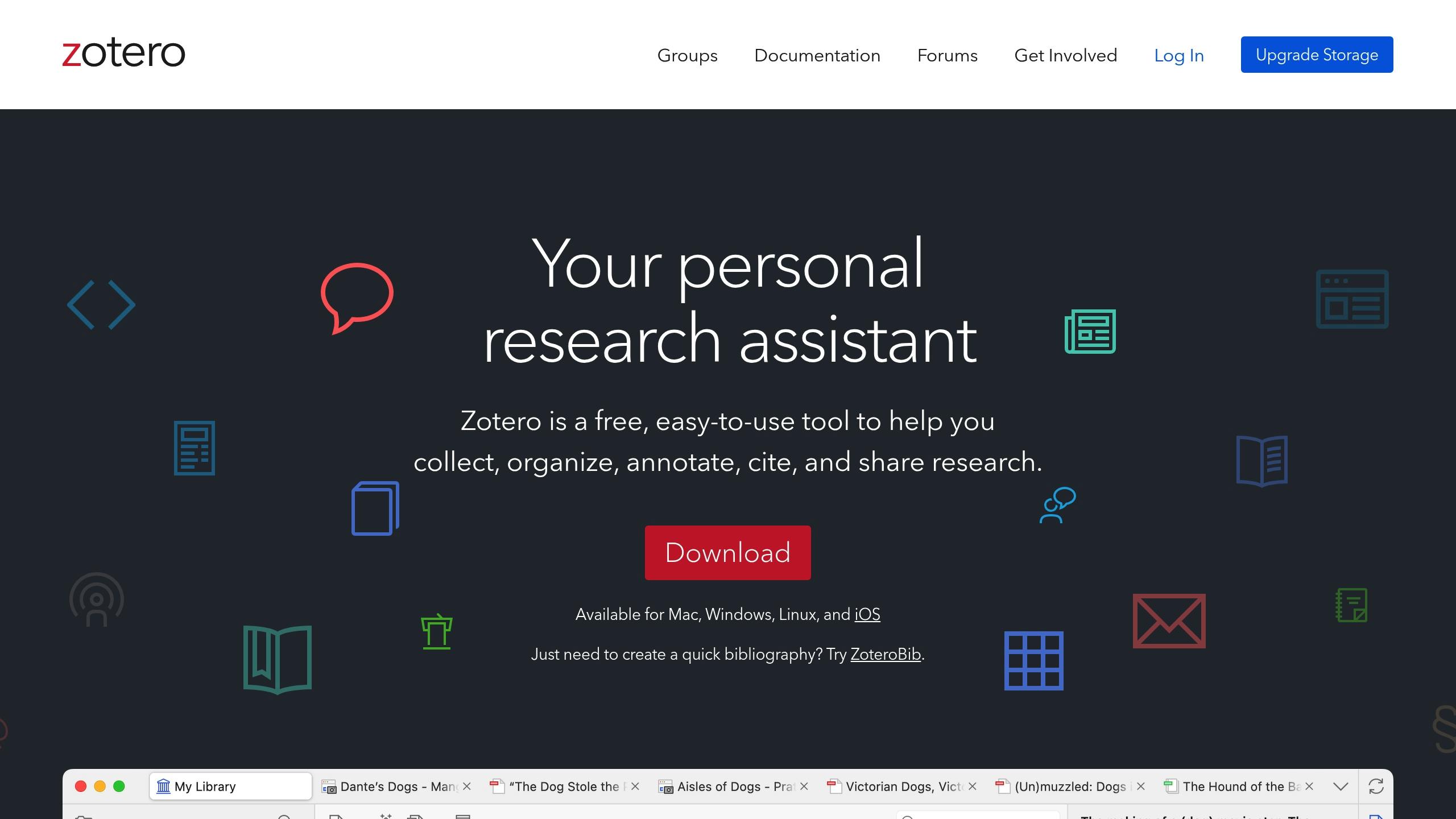
Choosing the right citation tool depends on your research style and specific needs. Let’s break it down:
Zotero is great for managing a wide range of sources. Its one-click capture feature works with more databases, catalogs, and websites than Mendeley's browser extension. If you often cite non-PDF sources, Zotero might be your go-to option.
Mendeley shines when it comes to collaboration. It offers useful free features like:
- Cloud syncing
- PDF annotation tools
- Team collaboration options
- A community platform for networking
EndNote is ideal for handling large, complex projects. It provides advanced citation tools, organized libraries, and precise formatting, making it a strong choice for managing extensive bibliographies.
How to decide? Think about your workflow:
- Do you need to work with a variety of source types? Zotero is a solid pick.
- Collaborating with others? Mendeley’s team features are hard to beat.
- Tackling a big project with lots of citations? EndNote’s advanced tools are worth exploring.
Keep in mind factors like the types of materials you use, your need for collaboration, and the complexity of your projects. All three tools offer free features, but premium options vary.
